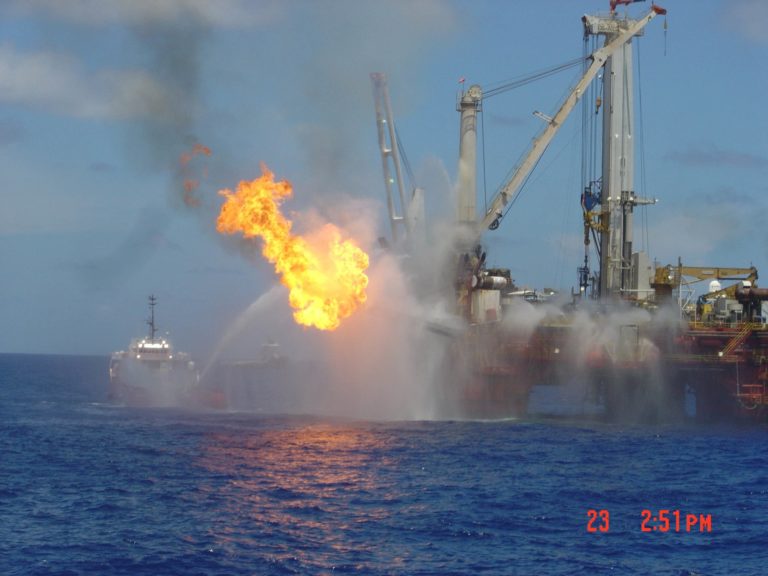
In a gift to polluting fossil fuel industries, the Bureau of Ocean Energy Management recently released its new five-year plan (called the “Draft Proposed Program”) for offshore drilling. It’s a massive hand-out to the oil and gas industry that targets over 90 percent of the Outer Continental Shelf, impacting nearly every coastal state. This is the single largest expansion of offshore drilling activity ever proposed, and it is especially concerning given the administration’s simultaneous efforts to weaken safety regulations for offshore drilling.
Opening up more of our oceans to drilling is dangerous for many reasons. For example, in 2015, a ruptured pipeline spewed over 100,000 gallons of crude oil onto the pristine Gaviota Coast near Santa Barbara, California with an estimated 21,000 gallons reaching the water. The Refugio spill killed hundreds of ocean creatures, closed popular beaches for weeks, and shut down fisheries for 138 square miles, severely impacting the area’s commercial and recreational anglers. In the Gulf of Mexico, the catastrophic Deepwater Horizon explosion and spill in 2010 took 11 human lives and caused more than $17 billion in damages to natural resources in the Gulf of Mexico.
Over the last year, the Trump Administration has issued various executive and secretarial orders to erode regulations for oil and gas drilling. They have gone so far in their efforts to enrich polluting industries that they ordered the National Academies of Sciences, Engineering, and Medicine to stop work on a study intended to enhance safety regulations for offshore oil and gas operations. The Trump Administration is proposing an offshore drilling free-for-all that threatens coastal communities around the United States with the devastating impacts of irresponsible fossil fuel extraction and increases the chances of another major oil spill.
We should not risk another disaster so that we can subsidize a dirty and outdated energy source.
We don’t have to choose between a vibrant national economy and clean, safe and healthy local environments. We can have both. The success of Marine Protected Areas along California’s coast proves that making smart investments that protect our environment can benefit fisheries and tourism while preserving ecological habitats.
We need to stand up for safe and sane energy policies that fuel our communities, care for the health of our people and our planet, and create well-paying jobs. The federal government is accepting comments until March 9th on the Draft Proposed Program, so now is the time to speak up!
Please take a few minutes to submit your comments and tell the Trump administration that you do not want to see any more leasing of public lands for offshore drilling. Below is a sample letter for you to use — but your comment will be even more impactful if you include your personal experiences. For example, talk about your connections to coastal communities, fishing businesses, tourism, or simply your desire for our government to stop subsidizing fossil fuels and instead transition to a clean and just energy economy.
SAMPLE LETTER
Dear Ms. Kelly Hammerle:
Thank you for this opportunity to comment on the “2019-2024 Draft Proposed Outer Continental Shelf Oil and Gas Leasing Program” (Draft Proposed Program). I am writing to express my opposition to the proposed expansion of offshore leasing for oil and gas drilling. Opening up nearly all of the coastal areas in the United States to offshore drilling is not in the public interest, as it would have devastating impacts on our coastal communities, oceans, and climate.
Expanding leasing for offshore oil and gas drilling sets us on the wrong course for our economy, our public health, and our environment. As the Draft Proposed Program itself admits, opening more areas to leasing means that, for years to come, companies will be building out drilling infrastructure, locking us into decades of increasing fossil fuel dependence. There is no evidence that we need offshore oil and gas for energy independence or a strong economy — rather, expanding offshore drilling puts the economies of thousands of coastal communities at grave risk.
Offshore drilling companies have demonstrated time and time again that there is no safe way to drill for oil and gas in a marine environment. For example, while the Gulf of Mexico is trying to recover from the massive BP oil spill, it continues to be plagued by constant small-scale oil spills, including the Taylor Energy oil leak that has been ongoing since 2004 and which the company claims cannot be stopped. How can the federal government propose allowing more offshore drilling when we already know that it cannot be done safely?
Offshore drilling and the seismic airgun blasting that comes with it also have devastating impacts on ocean life, which is already under extreme pressure from climate change impacts, overfishing, and pollution. Coastal communities rely on safe, healthy oceans; their economies and ways of life could be wiped out by another major oil spill.
[Insert your own personal message here. Consider the following:
- Why protecting our oceans is so important to you.
- Why preserving coastal areas is important to you (for example: Do you have a favorite beach you could not imagine being covered in oil?)
- Why you want to see the United States move away from promoting fossil fuel production.]
Our public resources should not be managed in a manner that puts the profits of a few companies before the well-being of millions of Americans. Therefore, I urge you to neither approve the Draft Proposed program nor schedule any new lease sales in the Gulf of Mexico, the Atlantic, Pacific, and Arctic Oceans, or in any national marine sanctuary or marine national monument.
Thank you for considering my comments.
Sincerely,
[YOUR NAME]
Feature image of the Deepwater Horizon emergency response efforts by the National Institute for Occupational Safety and Health.